Tanzania Tours
This is a site whereby you can find all information concerning tourism attraction including contacts to those sites in Tanzania. We provide enough information about Tanzania which will inspire you to come and feel the different to our nation Tanzania. Phone:+255714183520 Or +255754932585 E-mail: emmanuelswilla@yahoo.com / emmanuelswilla@gmail.com
Saturday, 9 January 2016
15 Top-Rated Tourist Attractions in Tanzania
Tanzania is home to some of Africa's most famous national parks and
the majestic Mount Kilimanjaro rising above the Serengeti. Most visitors
will find themselves passing through Dar es Salaam and heading out on
safaris and various wildlife viewing adventures. For those who want to
take a break and spend some time soaking up the sun, the beautiful
beaches of Zanzibar beckon. Off Pemba and Mafia islands is a whole other
kind of natural wonder, one most appreciated by the scuba divers and
snorkelers who come here from around the world to experience the coral
gardens, colorful fish, and crystal clear waters.
1 Mount Kilimanjaro
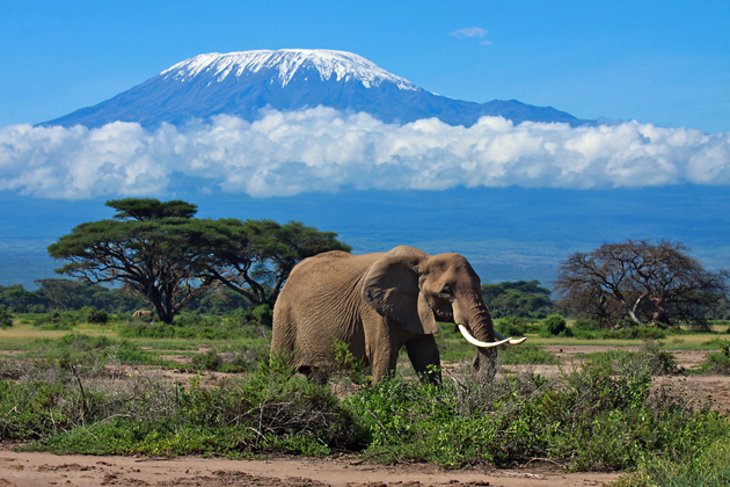
Mount Kilimanjaro
Share:
One of the most frequented attractions in Tanzania, Mount Kilimanjaro
National Park is home to Africa's highest mountain peak. Unlike other
parks in northern Tanzania, this one is not visited for the wildlife but
for the chance to stand in awe of this majestic snow-capped mountain
and, for many, to climb to the summit. Mount Kilimanjaro can be climbed
at any time, although the best period is from late June to October,
during the dry season.
Kilimanjaro, a World Heritage Sites, was formed over 1 million years ago by volcanic movement along the Rift Valley. Three points - Shira, Kibo, and Mawenzi came to be about 750,000 years ago. The highest point is Uhuru Peak on Kibo, which is one of the Seven Summits of the world.
The mountain rises from farmland on the lower level to rainforest and alpine meadow and then barren lunar landscape at the peaks. The slopes of the rainforest are home to buffaloes, leopards, monkeys, elephants and eland. The alpine zone is where bird watchers will find an abundance of birds of prey.
Kilimanjaro, a World Heritage Sites, was formed over 1 million years ago by volcanic movement along the Rift Valley. Three points - Shira, Kibo, and Mawenzi came to be about 750,000 years ago. The highest point is Uhuru Peak on Kibo, which is one of the Seven Summits of the world.
The mountain rises from farmland on the lower level to rainforest and alpine meadow and then barren lunar landscape at the peaks. The slopes of the rainforest are home to buffaloes, leopards, monkeys, elephants and eland. The alpine zone is where bird watchers will find an abundance of birds of prey.
Accommodation: Where to Stay near Mount Kilimanjaro - TripAdvisor.com
2 Serengeti National Park
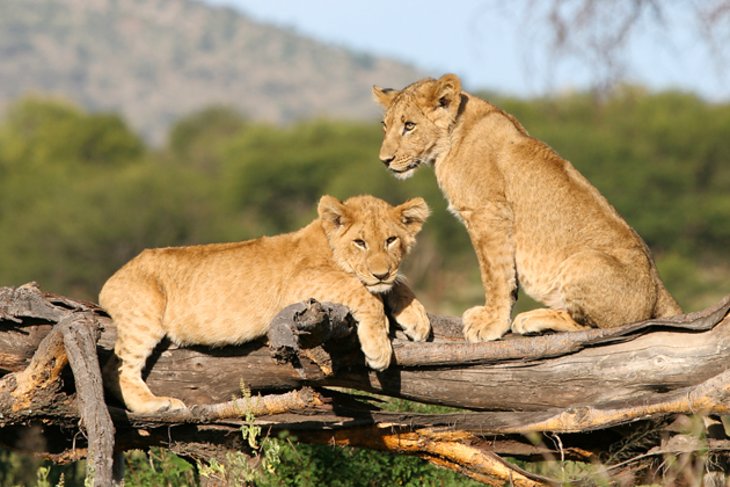
Serengeti National Park
Share:
Serengeti National Park is a vast treeless plain with thousands, even
millions of animals searching for fresh grasslands. As the largest
national park in Tanzania, the Serengeti attracts thousands of tourists
each year. The best months for wildlife viewing are between December and
June. The wet season is from March to May, with the coldest period from
June to October. The annual migration of millions of zebra and
wildebeest takes place in May or early June. This migration is one of
the most impressive natural events and the primary draw for many
tourists.
Large herds of antelope as well as lion, leopard, cheetah, hyena, bat eared fox, hunting dog and jackal are also found in Serengeti National Park. Nearly 500 species of bird have been recorded on the Serengeti. Many of these are attracted to the swamp area. 'Serengeti' means an 'extended place' in the Maasai language.
Large herds of antelope as well as lion, leopard, cheetah, hyena, bat eared fox, hunting dog and jackal are also found in Serengeti National Park. Nearly 500 species of bird have been recorded on the Serengeti. Many of these are attracted to the swamp area. 'Serengeti' means an 'extended place' in the Maasai language.
Official site: http://www.serengeti.org/
Accommodation: Where to Stay in Serengeti National Park - TripAdvisor.com4 Ngorongoro Conservation Area
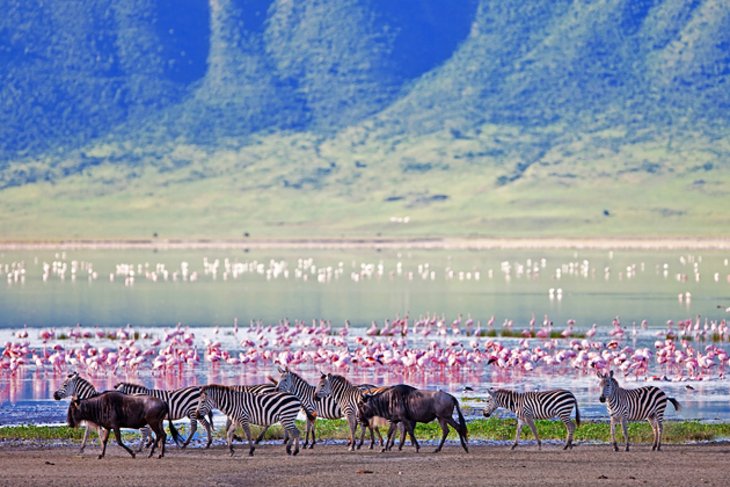
Ngorongoro Conservation Area
Share:
Located between the Serengeti and Lake Manyara, the Ngorongoro Conservation Area is home to the famous volcanic Ngorongoro Crater
and one of Tanzania's most popular wildlife viewing areas. This huge
volcanic crater has a permanent supply of water which draws all kinds of
animals who stay in this area rather than migrating. Visitors come here
primarily for viewing large game and bird watching, but also of
interest in the conservation area is the Olduvai Gorge. This
important archeological site has revealed ancient skull and bone
fragments that have delivered critical information about early mankind.
The Ngorongoro Crater is the largest intact ancient caldera in the world, nearly three million years old. The Ngorongoro volcano was one of the world's tallest mountains before it exploded and collapsed. Thousands of wild game can be seen on the crater floor, including lions, elephants, rhinos, Thomson's gazelles, and buffaloes, but wildebeests and zebras account for over half of the animals that call the Ngorongoro Crater home. Bird watching is superb, especially around Lake Migadi, which attracts flocks of flamingoes to the shallows. Hippos are content to submerge themselves during the day and then graze in the nearby grass in the evening.
Olduvai Gorge
The Olduvai Gorge is an archeological site situated on a series of fault lines, where centuries of erosion have revealed fossils and remnants of early mankind. As early as 1911, a German professor found some fossil bones while looking for butterflies in Olduvai Gorge. In a later expedition, the Leakeys collected skull fragments, a skull, and bones determined to be approximately 2 million years old. Tools and hunting weapons from 1 to 1.5 million years ago were also discovered in Olduvai Gorge. Another exciting find were the famous footprints of a man, woman and child at Laetoli, near Olduvai. These and other discoveries provide more evidence to the theory that at least three hominid species were in this region over 2 million years ago.
The Ngorongoro Crater is the largest intact ancient caldera in the world, nearly three million years old. The Ngorongoro volcano was one of the world's tallest mountains before it exploded and collapsed. Thousands of wild game can be seen on the crater floor, including lions, elephants, rhinos, Thomson's gazelles, and buffaloes, but wildebeests and zebras account for over half of the animals that call the Ngorongoro Crater home. Bird watching is superb, especially around Lake Migadi, which attracts flocks of flamingoes to the shallows. Hippos are content to submerge themselves during the day and then graze in the nearby grass in the evening.
Olduvai Gorge
The Olduvai Gorge is an archeological site situated on a series of fault lines, where centuries of erosion have revealed fossils and remnants of early mankind. As early as 1911, a German professor found some fossil bones while looking for butterflies in Olduvai Gorge. In a later expedition, the Leakeys collected skull fragments, a skull, and bones determined to be approximately 2 million years old. Tools and hunting weapons from 1 to 1.5 million years ago were also discovered in Olduvai Gorge. Another exciting find were the famous footprints of a man, woman and child at Laetoli, near Olduvai. These and other discoveries provide more evidence to the theory that at least three hominid species were in this region over 2 million years ago.
Accommodation: Where to Stay in Ngorongoro - TripAdvisor.com
5 Lake Manyara National Park
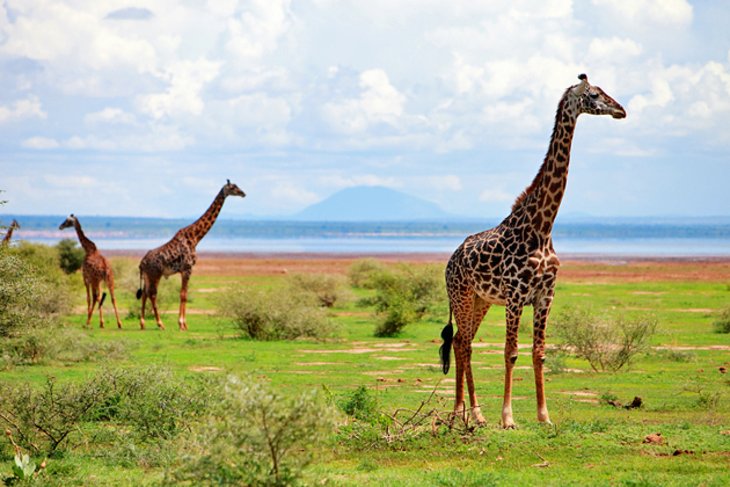
Lake Manyara National Park
Share:
Lake Manyara National Park is comprised of forest, woodland,
grasslands, and swamps. Two-thirds of the park is covered by water and
Lake Manyara is host to thousands of flamingoes, at certain times of
year, as well as other diverse bird life. The highlight of Lake Manyara
Park is the large population of elephants, tree-climbing lions and
hippos that can be observed at a much closer range than in other parks.
This park is also home to the largest concentration of baboons in the
world.
Wildlife drives, canoeing (when water levels are high enough), mountain bike tours and bird watching are the most popular activities in Lake Manyara National Park.
Wildlife drives, canoeing (when water levels are high enough), mountain bike tours and bird watching are the most popular activities in Lake Manyara National Park.
Official site: http://www.tanzaniaparks.com/manyara.html
Accommodation: Where to Stay near Lake Manyara - TripAdvisor.com6 Mafia Island
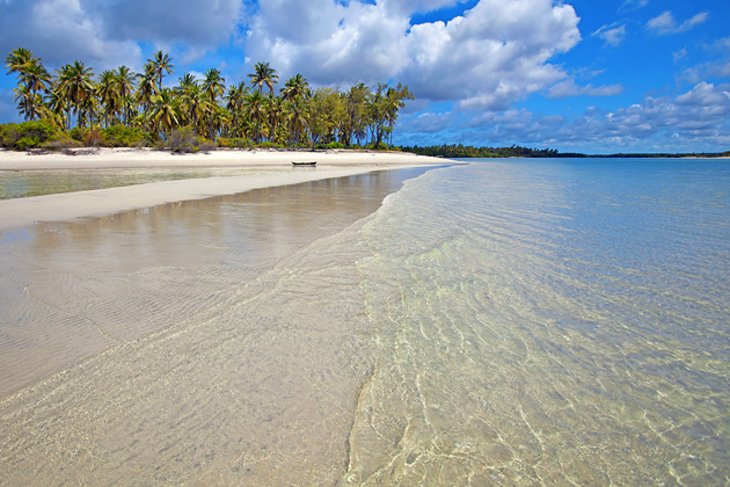
Mafia Island
Share:
Mafia Island draws divers and snorkelers from around the world to the
undersea world protected by the Mafia Island Marine Park. The best
months for diving are October to March but the best weather on Mafia
Island is May to October, March and April are months of heavy rain.
Mafia Island Marine Park has excellent coral gardens, an abundant
variety of fish and a relaxed diving atmosphere. Countless birds and
over 400 species of fish can be seen in the area. Mafia Island is also a
traditional breeding site for the green turtle, which are unfortunately
close to extinction.
Mafia is also a desirable location for deep-sea fishing, especially tuna, marlin, sailfish and other big-game fish.
This island paradise first saw settlers in the 8th or 9th C, but Mafia became a more important settlement during the 12th to 14th C when it held a key position in the East African trading routes.
Mafia is also a desirable location for deep-sea fishing, especially tuna, marlin, sailfish and other big-game fish.
This island paradise first saw settlers in the 8th or 9th C, but Mafia became a more important settlement during the 12th to 14th C when it held a key position in the East African trading routes.
Official site: http://www.mafiaisland.com/
7 Tarangire National Park
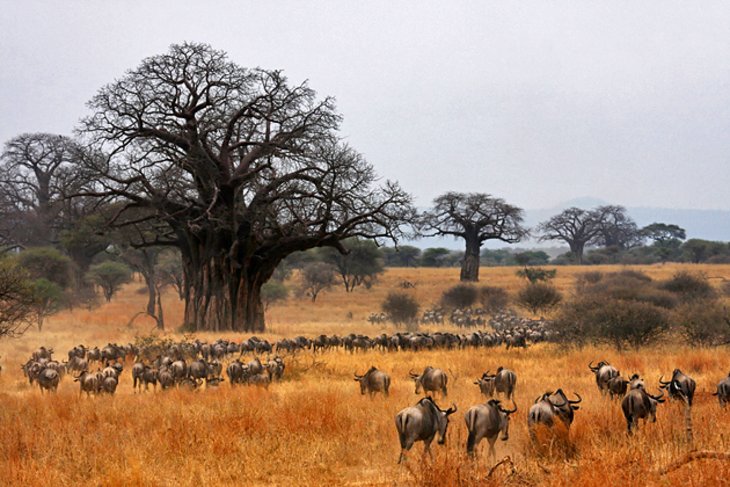
Tarangire National Park
Share:
Tarangire National Park was established in 1970 and is best visited
in the dry season from July to September when the animals gather along
the river. During the dry season, Tarangire National Park has one of the
highest concentrations of migratory wildlife. Wildebeest, zebra,
buffalo, impala, gazelle, hartebeest and eland crowd the lagoons. One of
the most noticeable highlights of Tarangire National Park is the baobab
trees that dot the grassy landscape.
The park is excellent for birdwatching, with more than 300 species recorded in Tarangire. These species include buzzards, vultures, herons, storks, kites, falcons and eagles.
The park is excellent for birdwatching, with more than 300 species recorded in Tarangire. These species include buzzards, vultures, herons, storks, kites, falcons and eagles.
Official site: http://www.tanzaniaparks.com/tarangire.html
8 Pemba Island
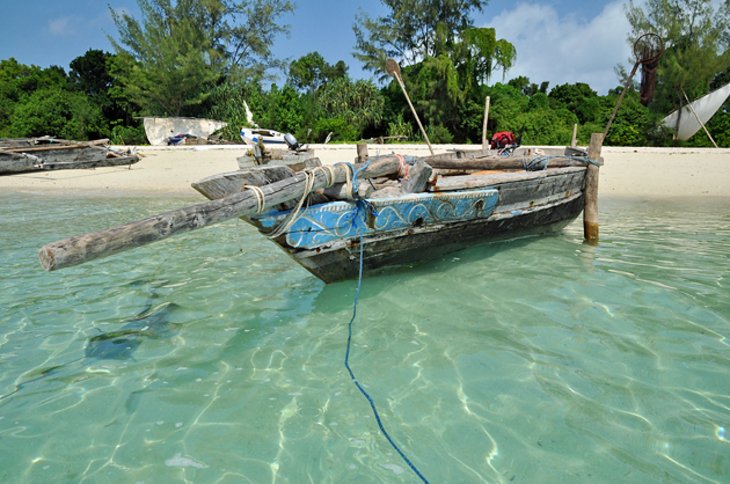
Pemba Island
Share:
Pemba Island is the northernmost island in the Zanzibar archipelago.
Around Pemba are many desert islands and some of the best scuba diving
in the Indian Ocean, with visibility that is unparalleled. Lush coral
gardens, colorful sponges and sea fans are all found in the underwater
haven. The city of Chake Chake, the main population center on Pemba, is a
popular base for scuba divers.
Pemba is less visited than Zanzibar and as a result has a more laidback atmosphere. From December to February visitors can watch traditional bullfighting; a sign from the days of Portuguese dominance in the 16th and 17th C. The island is hilly with deep valleys so it has become popular with mountain bikers who are drawn to the 1,000-meter peaks.
Pemba is a major world clove producer and is also well known for the juju traditions of medicine and magic. People come from throughout East Africa to learn from the voodoo and traditional healers or seek a cure.
Pemba is less visited than Zanzibar and as a result has a more laidback atmosphere. From December to February visitors can watch traditional bullfighting; a sign from the days of Portuguese dominance in the 16th and 17th C. The island is hilly with deep valleys so it has become popular with mountain bikers who are drawn to the 1,000-meter peaks.
Pemba is a major world clove producer and is also well known for the juju traditions of medicine and magic. People come from throughout East Africa to learn from the voodoo and traditional healers or seek a cure.
Accommodation: Where to Stay on Pemba Island - TripAdvisor.com
9 Stone Town
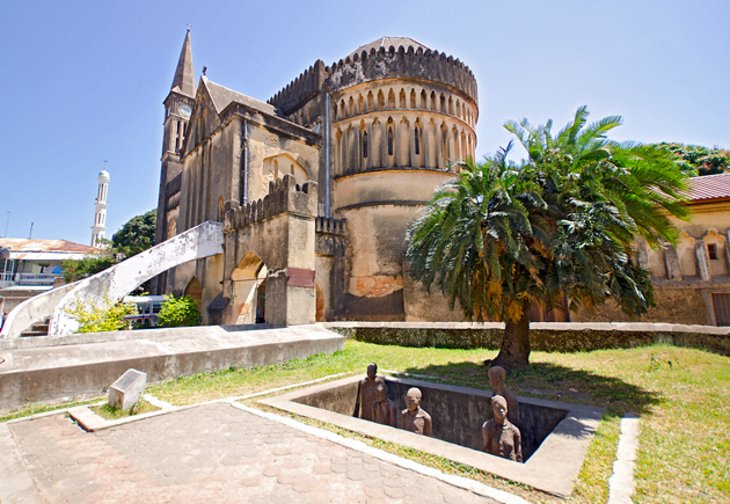
Stone Town
Share:
Stone Town is the cultural heart of Zanzibar and little has changed
in the last 200 years. The grand old Arabian homes lining the narrow
streets and winding alleys give the city its own unique charm. The
majority of homes in Stone Town were built in the 19th C when Zanzibar
was one of the most important Swahili trading towns in the Indian Ocean.
Visitors will notice the bras-studded, intricately carved wooden doors
on many of the houses.
As the world's oldest functioning Swahili city, many of the landmarks in Stone Town have been restored to their original glory. Some of the historic buildings are now museums which can be visited. The town also has a couple of interesting old churches of historical significance. A walk along Creek Road takes visitors to the original Stone Town area and the location of the Central Darajani Market, Beit el-Amani, City Hall, and the Anglican Cathedral. Some of the other key highlights include the Forodhani Gardens, the Old Dispensary with its carved wooden balconies, the former home of the sultans known as Beit el-Sahel or the People's Palace, the Hamamni Persian Baths built in 1888, and the oldest structure in Stone Town, the Old Fort.
As the world's oldest functioning Swahili city, many of the landmarks in Stone Town have been restored to their original glory. Some of the historic buildings are now museums which can be visited. The town also has a couple of interesting old churches of historical significance. A walk along Creek Road takes visitors to the original Stone Town area and the location of the Central Darajani Market, Beit el-Amani, City Hall, and the Anglican Cathedral. Some of the other key highlights include the Forodhani Gardens, the Old Dispensary with its carved wooden balconies, the former home of the sultans known as Beit el-Sahel or the People's Palace, the Hamamni Persian Baths built in 1888, and the oldest structure in Stone Town, the Old Fort.
Accommodation: Where to Stay in Stone Town - TripAdvisor.com
10 Selous Game Reserve
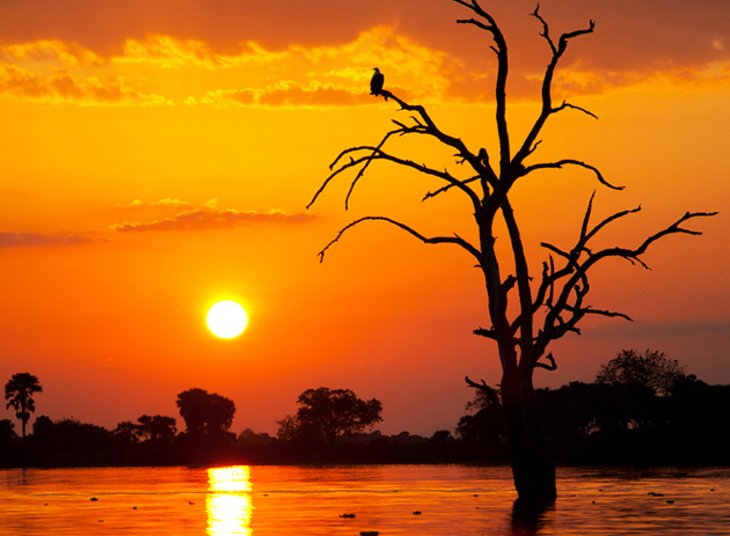
Selous Game Reserve
Share:
Selous is the largest game reserve in Africa. Established in 1922, it
covers 5% of Tanzania's total area. The southern area is a forbidden
zone that is undeveloped, heavily forested, and contains a series of
steep cliffs. Travelers are limited to the area north of the Rufiji
River. This area of the Selous Game Reserve has large open grassland,
woodlands, rivers, hills and plains. The best time to visit is July
through October.
The Rufiji River bisects the Selous Game Reserve and has the largest catchment area of any river in East Africa. The river is an important feature of the reserve providing the opportunity to watch the diverse water-based wildlife. A broad range of game can be found including elephants, hippos and rhinos as well as buffalo, antelope, giraffe, warthog, wildebeest, lion, leopard and cheetah. The diversity of bird life in Selous includes over 350 recorded species.
The Rufiji River bisects the Selous Game Reserve and has the largest catchment area of any river in East Africa. The river is an important feature of the reserve providing the opportunity to watch the diverse water-based wildlife. A broad range of game can be found including elephants, hippos and rhinos as well as buffalo, antelope, giraffe, warthog, wildebeest, lion, leopard and cheetah. The diversity of bird life in Selous includes over 350 recorded species.
11 Arusha National Park
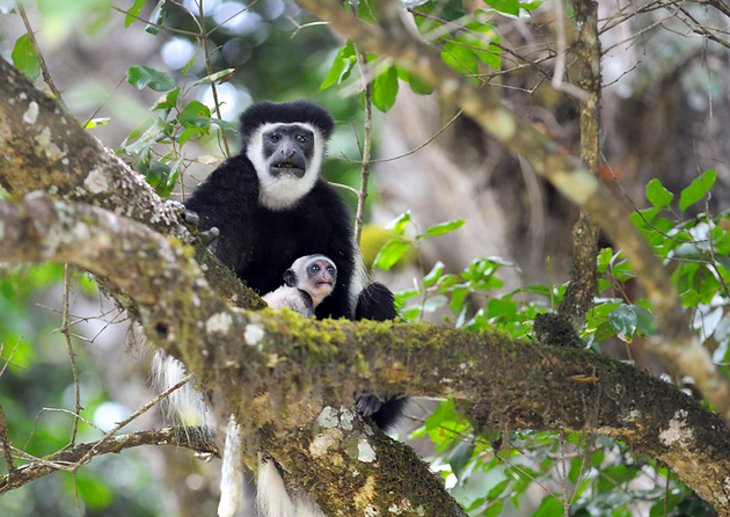
Arusha National Park
Share:
Arusha National Park, although smaller than most in Tanzania, has a
range of habitats that consist of the forest of Mount Meru, Ngurdoto
Crater in the southeast section of the park, and Momela Lakes, a series
of seven crater lakes. Black and white Colobus monkeys are easily
spotted in the forested area while the marshy floor of the crater is
dotted with herds of buffalo, zebra and warthog. Momela Lakes is home to
a large selection of resident and migrant waterbirds. People come here
to see wildlife and also to climb Mount Meru.
Mount Meru is one of the most beautiful volcanoes in Africa and the second highest mountain in Tanzania. The summit is reached by a narrow ridge, which provides stunning views of the volcanic cone lying several thousand feet below in the crater. The ascent is steep but the route passes through parkland, forest, a giant heather zone and moorland.
Mount Meru is one of the most beautiful volcanoes in Africa and the second highest mountain in Tanzania. The summit is reached by a narrow ridge, which provides stunning views of the volcanic cone lying several thousand feet below in the crater. The ascent is steep but the route passes through parkland, forest, a giant heather zone and moorland.
Official site: http://www.tanzaniaparks.com/arusha.html
Accommodation: Where to Stay in Arusha - TripAdvisor.com12 Ruaha National Park
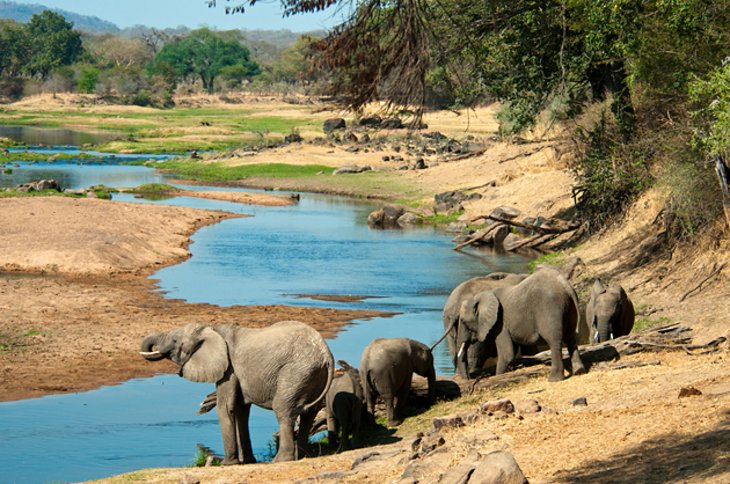
Ruaha National Park
Share:
Ruaha National Park is the least accessible park in Tanzania and as a
result the landscape remains relatively untouched. Birdwatcher's can
enjoy over 400 species of bird that are not found in northern Tanzania,
and the river, spectacular gorges, and majestic trees are especially
appealing to photographers. As Tanzania's second largest park, Ruaha has
large herds of buffalo, elephant and gazelle. The concentration of
elephants are some of the largest in Tanzania. The Great Ruaha River is
the main feature of Ruaha National Park providing magnificent wildlife
viewing on the banks. The river also provides much of the electricity to
Tanzania through a hydroelectric dam at Kidatu.
Official site: http://www.tanzaniaparks.com/ruaha.html
13 Katavi National Park
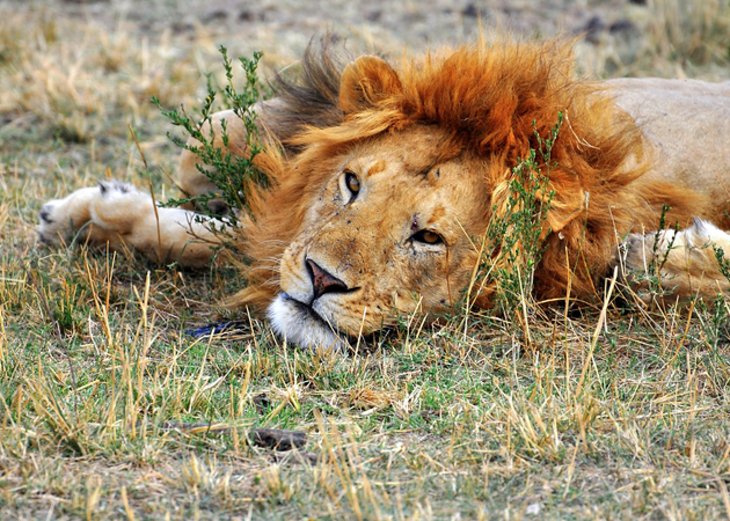
Katavi National Park
Share:
Katavi National Park is located in a remote location offering
unspoiled wilderness. A predominant feature in Katavi is the enormous
flood plain, split by the Katuma River and several seasonal lakes. The
lakes support enormous groups of hippos, crocodiles and over 400 species
of birds. One of the spectacles in Katavi is the hippos at the end of
the dry season when as many as 200 try to squeeze into a pool of water.
The male rivalry heats up causing territorial fights.
The dry season brings Katavi National Park to life, herds of impala, reedbuck, lions, zebras and giraffes can be seen at the remaining pools and streams. An estimated 4,000 elephants and several herds of buffaloes in the thousands also converge on the park when the flood waters retreat.
The dry season brings Katavi National Park to life, herds of impala, reedbuck, lions, zebras and giraffes can be seen at the remaining pools and streams. An estimated 4,000 elephants and several herds of buffaloes in the thousands also converge on the park when the flood waters retreat.
Official site: http://www.tanzaniaparks.com/katavi.html
14 Gombe Stream National Park
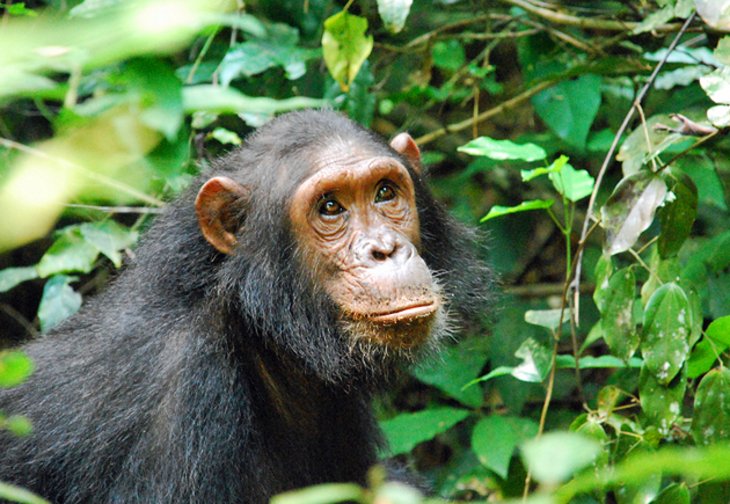
Gombe Stream National Park
diasUndKompott
Share:
Gombe Stream National Park is primarily for those who want to get a
little off the beaten track and see chimpanzees. This is the smallest
national park in Tanzania and is famous for the work of Jane Goodall.
This British researcher arrived in 1960 to study the wild chimpanzees
and her work turned into what would become the longest running
behavioral research program of its kind in the world. Guided walks take
visitors into the forest to observe chimps in the wild. Many species of
primates and mammals live in the park. Over 200 bird species have been
recorded in the tropical forest, including barbets, starlings, sunbirds,
crowned eagle, kingfishers and the palm-nut vulture.
Hiking and swimming are other popular activities; a trail leads into the forest to a waterfall in the valley.
Hiking and swimming are other popular activities; a trail leads into the forest to a waterfall in the valley.
Official site: http://www.tanzaniaparks.com/gombe.html
15 Lake Victoria
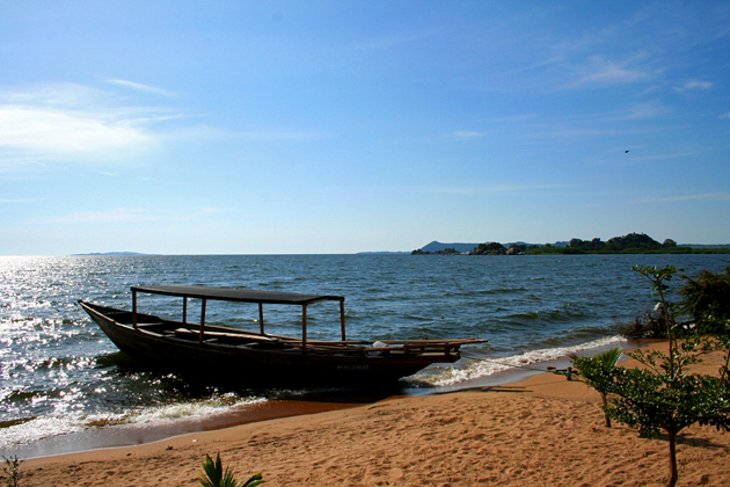
Lake Victoria
Share:
Lake Victoria is the largest freshwater lake in Africa and is
bordered by Kenya, Tanzania and Uganda. This lake is the source of the
White Nile and provides an income for millions of residents along its
shores. The Tanzanian section of Lake Victoria is one of the least
visited regions in the country, however the towns of Bukoba, Musoma and
Mwanza have a number of attractions. Near Mwanza and Musoma are many
islands, some have become wildlife sanctuaries. Bird watching and
fishing trips are popular excursions, and boat trips or hikes can be
arranged around Lake Victoria.
Rubondo Island National Park, which includes several other smaller islands, is on the southwest shores of Lake Victoria.
Source: http://www.planetware.com/tourist-attractions/tanzania-tza.htm
Rubondo Island National Park, which includes several other smaller islands, is on the southwest shores of Lake Victoria.
Source: http://www.planetware.com/tourist-attractions/tanzania-tza.htm
Thursday, 16 January 2014
Tanzania (Dar es Salaam) is among of the best place to be in 2014
 Tanzania may be best known for the snow-capped peaks of Mount
Kilimanjaro and the game-packed plains of the Serengeti, but the real
pulse of the country is found in its largest city, Dar es Salaam. An
eclectic mix of music echoes through the beach clubs, open-air bars and
nightclubs of this Indian Ocean coastal city. Old-school dance music
competes with Swahili hip-hop and traditional drumming, all drawing from
the city’s African, Indian and Arab influences. Add in the street food,
the beaches and the fact that the year-old African low-cost carrier Fastjet
uses Dar as its hub, and it’s easy to see that this commercial capital
is more than a stopover on the way to Tanzania’s natural splendor. It is
an African metropolis coming into its own. — RACHEL B. DOYLE
Tanzania may be best known for the snow-capped peaks of Mount
Kilimanjaro and the game-packed plains of the Serengeti, but the real
pulse of the country is found in its largest city, Dar es Salaam. An
eclectic mix of music echoes through the beach clubs, open-air bars and
nightclubs of this Indian Ocean coastal city. Old-school dance music
competes with Swahili hip-hop and traditional drumming, all drawing from
the city’s African, Indian and Arab influences. Add in the street food,
the beaches and the fact that the year-old African low-cost carrier Fastjet
uses Dar as its hub, and it’s easy to see that this commercial capital
is more than a stopover on the way to Tanzania’s natural splendor. It is
an African metropolis coming into its own. — RACHEL B. DOYLE
According to New York Times.
Your welcome to Dar es salaam
Monday, 6 January 2014
Fast jet bring low-cost flights into Lusaka, Zambia
 Fastjet has announced the launch of its second international route from Dar es Salaam, Tanzania to Lusaka, Zambia.
Fastjet has announced the launch of its second international route from Dar es Salaam, Tanzania to Lusaka, Zambia.The launch coincides with celebrations marking one year of flight operations from fastjet's main hub at Dar es Salaam's Julius Nyerere airport in Tanzania.
Despite strong trading between Tanzania and Zambia, driven in part by landlocked Zambia's reliance on Dar es Salaam's port, there is currently no direct air link between Dar es Salaam and Lusaka.
A steady increase in the onerous, 25 hour cross-border journeys undertaken by both Tanzanians and Zambians by road, demonstrates a real need for affordable air travel between the two countries, which fastjet intends to fulfil by launching its flights along this route.
Flights on fastjet's new route, which will initially operate twice a week, are available to purchase from next week with fares starting as low as $75 (plus government charges and taxes), significantly lower than fares from operators offering non-direct flights between the two cities.
The first flight is scheduled to take place on 1st February 2014.
"We look forward to bringing the benefits of affordable, high-quality air travel to the people of Zambia."
Subscribe to:
Posts (Atom)
